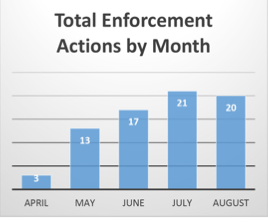Sheppard Mullin’s COVID-19 Oversight and Enforcement Response Team has tracked civil and criminal federal enforcement actions around the country since the passage of the Coronavirus Aid, Relief, and Economic Security Act (the “CARES Act”) in March 2020. New cases are noted in our COVID-19 Enforcement Actions Tracker. These cases illustrate the federal government’s interest in punishing wrongdoing related to COVID-19 and CARES Act funding. Here are some trends we have seen from March through August 2020:

The federal government has mostly responded through criminal enforcement actions by U.S. Attorney’s offices, with new criminal indictments released nearly every day. Prosecutions have largely focused on traditional fraudsters that made intentional misrepresentations to defraud the government, financial institutions, or private citizens. Consistent with DOJ’s stated policy, we have yet to see enforcement actions for accidental misrepresentations, which are more common in investigations of corporate defendants unrelated to COVID-19.
Enforcement cases have mostly included criminal enforcement actions by U.S. Attorney’s Offices, though the Securities and Exchange Commission (“SEC”) has brought some civil cases against companies for misleading investors through false statements related to COVID-19. The Congressional Oversight Committee announced in late July that it would investigate a CARES Act loan to a shipping company, and the Small Business Association (“SBA”) announced that it would be auditing PPP loans larger than $2 million. However, we have not seen civil enforcement actions by administrative agencies besides the SEC.
Enforcement has mainly focused on fraud related to CARES Act relief funds, such as the Paycheck Protection Program (“PPP”). These early cases have mostly prosecuted defendants who submitted false or fraudulent applications for PPP funds. For example, many defendants have been accused of submitting applications that misrepresent the applicant businesses’ payroll expenses—in the most extreme cases, applicants falsified names of employees for businesses that, in reality, had no employees at all. Many PPP cases alleged misuse of funds for personal expenses, such as purchasing sports cars, jewelry, and paying off personal debts. The government has prosecuted PPP fraud in many jurisdictions throughout the country. The government has prosecuted these cases under a wide range of criminal charges, including wire fraud, making a false statement to a financial institution, money laundering, and conspiracy.

Other common enforcement actions have included prosecutions for promoting fake COVID-19 treatments. Defendants were accused of selling treatments that were unproven and not FDA-approved for treating COVID-19, such as fake vaccines, herbal remedies, and chemical mixtures. While most defendants were small businesses, the president of a significant California medical technology company was prosecuted for promoting a fake test for COVID-19, similar to the blood test technology touted by Theranos.
The government has also prosecuted defendants for hoarding and price gouging of Personal Protective Equipment (“PPE”) under the Defense Production Act. These cases noted the defendants’ patterns of reselling the PPE at prices with exorbitant markups.


 i
i


